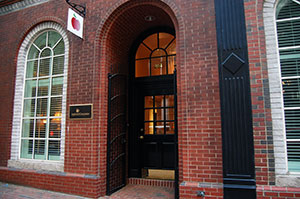A downtown REIT has successfully fended off one of several legal challenges to a merger last year that led to its current status as a publicly traded company.
A federal court judge in Richmond last week dismissed a class-action lawsuit brought against Apple Hospitality REIT, Apple REIT Cos. founder Glade Knight and other insiders from the company.
The lawsuit was filed by Dorothy Wenzel, a shareholder of the former Apple REIT Eight, which was combined with two other funds to create Apple Hospitality REIT. Wenzel’s suit alleged the fund’s directors, managers and advisers set the price of shares for a dividend reinvestment program at an artificially high rate. She alleged breach of contract, tortious interference, fraud, negligence and a violation of the Virginia Securities Act.
U.S. District Judge John A. Gibney Jr. dismissed the suit June 1, nearly a year after it was filed. In his formal opinion, Gibney said shareholders were adequately notified of the $11 per-share price for the dividend reinvestment program, or DRIP, which allowed them to forgo a cash dividend in favor of receiving more shares in the company.
Attorneys for Wenzel had argued that internal analyses conducted during that period had suggested the per-share value fell short of the $11, and that a potential third-party buyer had offered to purchase shares for as low as $3 per share.
Ultimately, Gibney said the arguments as stated in the suit did not prove a breach of contract or the other claims made.
“Wenzel may have felt swindled when she realized that the underlying value of (the fund) did not support an $11 per share valuation,” Gibney’s opinion states, “but that comes as a consequence of knowingly investing in a trust that was not traded on the open market, not the result of a breach of contract by any combination of defendants in this case.”
In his conclusion, Gibney said the complaint “convinces the Court that (the fund’s) DRIP may have been a bad investment for a variety of reasons, but it lacks sufficient facts to support the claims it alleges.”
Once combined, Apple Hospitality REIT began trading on the New York Stock Exchange on May 18 at $18 per share. The company’s stock, which trades under the symbol APLE, closed at $18.90 on Monday.
Wenzel’s lawsuit was one of several filed leading up to the merger that formed Apple Hospitality REIT. The previous month, a separate class-action lawsuit was filed by shareholder Susan Moses, who alleged the prices were artificially inflated and did not reflect the true value of the shares.
Another suit was filed Jan. 31, 2014, by Apple REIT Nine shareholders Jack and Loria Battaglia, who sought to undo the merger. The most recent filing in that case was May 6 for a settlement conference.
The day after Gibney’s dismissal of Wenzel’s suit, Apple REIT asked a federal court in New York to dismiss the Moses case on similar grounds.
A downtown REIT has successfully fended off one of several legal challenges to a merger last year that led to its current status as a publicly traded company.
A federal court judge in Richmond last week dismissed a class-action lawsuit brought against Apple Hospitality REIT, Apple REIT Cos. founder Glade Knight and other insiders from the company.
The lawsuit was filed by Dorothy Wenzel, a shareholder of the former Apple REIT Eight, which was combined with two other funds to create Apple Hospitality REIT. Wenzel’s suit alleged the fund’s directors, managers and advisers set the price of shares for a dividend reinvestment program at an artificially high rate. She alleged breach of contract, tortious interference, fraud, negligence and a violation of the Virginia Securities Act.
U.S. District Judge John A. Gibney Jr. dismissed the suit June 1, nearly a year after it was filed. In his formal opinion, Gibney said shareholders were adequately notified of the $11 per-share price for the dividend reinvestment program, or DRIP, which allowed them to forgo a cash dividend in favor of receiving more shares in the company.
Attorneys for Wenzel had argued that internal analyses conducted during that period had suggested the per-share value fell short of the $11, and that a potential third-party buyer had offered to purchase shares for as low as $3 per share.
Ultimately, Gibney said the arguments as stated in the suit did not prove a breach of contract or the other claims made.
“Wenzel may have felt swindled when she realized that the underlying value of (the fund) did not support an $11 per share valuation,” Gibney’s opinion states, “but that comes as a consequence of knowingly investing in a trust that was not traded on the open market, not the result of a breach of contract by any combination of defendants in this case.”
In his conclusion, Gibney said the complaint “convinces the Court that (the fund’s) DRIP may have been a bad investment for a variety of reasons, but it lacks sufficient facts to support the claims it alleges.”
Once combined, Apple Hospitality REIT began trading on the New York Stock Exchange on May 18 at $18 per share. The company’s stock, which trades under the symbol APLE, closed at $18.90 on Monday.
Wenzel’s lawsuit was one of several filed leading up to the merger that formed Apple Hospitality REIT. The previous month, a separate class-action lawsuit was filed by shareholder Susan Moses, who alleged the prices were artificially inflated and did not reflect the true value of the shares.
Another suit was filed Jan. 31, 2014, by Apple REIT Nine shareholders Jack and Loria Battaglia, who sought to undo the merger. The most recent filing in that case was May 6 for a settlement conference.
The day after Gibney’s dismissal of Wenzel’s suit, Apple REIT asked a federal court in New York to dismiss the Moses case on similar grounds.



